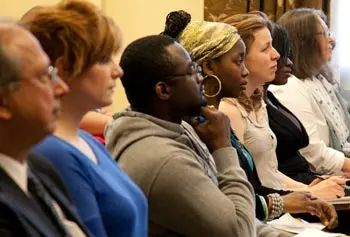Morse Lecture, Other Events Engage Students

05/03/2013
By Sandra Seitz
Still shaken in the aftermath of bombings at the iconic Boston Marathon, a large audience turned out for the F. Bradford Morse Distinguished Lecture to learn about building peace. George Lopez, chair of Peace Studies at Notre Dame University and UMass Lowell’s 2013 Brad Morse Scholar, presented “Imagining a Violence-Free World: Building the New Peace to End the New Violence.”
Lopez is a leading scholar of human rights, ethics and the use of force and economic sanctions between nations. He serves as an advisor to the U.N. Security Council, the European Union and to governments, foundations and organizations.
“It was an honor to meet and listen to the inspiring words of George Lopez,” said Jennifer Castano, student in the Peace and Conflict Studies graduate program and immigration specialist for U.S. Rep. Niki Tsongas. “I enjoyed how he managed to be witty, articulate and inspiring all at the same time, especially in talking about peace building in the wake of the Marathon tragedy.” Castano also holds a bachelor’s degree in criminal justice, with concentration in homeland security.
Changing Landscape of Violence
In recent decades, “war, the traditional nation-to-nation war, has declined,” said Lopez at the lecture, which was presented by UMass Lowell and Middlesex Community College in cooperation with the UMass Lowell Department of Political Science, the Peace and Conflict Studies Program and the Center for Arts and Ideas. “Now, 75 percent of large-scale violence is within national boundaries. Violence is more personal and intimate, more hateful.”
War has also become more deadly for civilians. Lopez pointed to the deaths of more than 22 million people through 32 years of armed conflicts in the Democratic Republic of the Congo.
Most terrorism happens within boundaries, as part of ongoing conflicts or groups jockeying for position. The same day as the Marathon bombings, for example, 16 bombs exploded in public places in Iraq as the country nears elections. International terrorism is relatively rare.
Lopez pushed the audience to think of conflict transformation as a long-term process, not just getting to a treaty agreement.
“Traditionally, countries went from stable diplomacy to crisis, conflict, ceasefire and then a treaty,” he said. “The borders separated the combatants; everyone went home and developed peaceful associations.”
That model has changed and governments should “worry less about military outcomes and more about the economic and social end-game,” Lopez said. “We need long-term planning and strategizing — peace games, not just war games. Where is the plan for building a non-nuclear, peaceful North Korea?”
North Korean Sanctions: Effective?
U.S. governmental policy toward North Korea was the subject when Lopez met with students of the course International Political Economy, led by political science Prof. John Wooding, who also directs the graduate program in Economic and Social Development.
“Mr. Lopez had an awesome position with the U.N. Security Council that’s relevant to the current crisis,” says Steven Rash, a junior majoring in political science and English. “He brought clarity to the situation — that a new leader is trying to impress his generals and show the nation his strength. He’s acting dangerously and his threats are leading to nothing good.”
Sanctions have worked occasionally to change a situation, but North Korea “is refusing to react to sanctions,” says Rash. “It raises the issue of state autonomy, how much to allow and how much to intervene. “There’s only so long a nation can be completely different from other nations. It causes sparks, like chemical reactions.”
Career Pathways in Peace Studies
During his visit, Lopez led a webinar discussion with students about careers in international peace-building. The conference included UMass Lowell students and hundreds of participants from 33 countries.
“The webinar taught me more about ways I can unveil and use my full potential in my field,” said Castano. “I enjoyed being in a setting where other students have the same passion for peace and conflict studies as I do.”
The webinar was made possible by a grant from the U.S. Institute of Peace, through its Public Education for Peacebuilding initiative, to UMass Lowell’s Peace and Conflict Studies program. The grant was co-written by Paula Rayman, director of Peace and Conflict Studies, and Seth Izen, project manager for the (http://www.uml.edu/international-programs/Middle-East-Center/default.aspx) Middle East Center and Peace and Conflict Studies.
